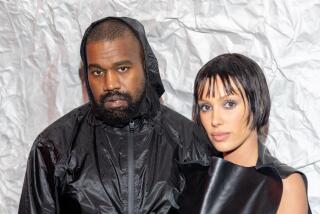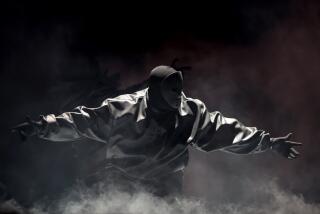Critic’s Notebook: Kanye West’s growing pains
Here’s a quote that recently resonated with Kanye West: “Every child is an artist. The problem is staying an artist when you grow up.” Pablo Picasso said that. West found it on a poster somewhere, took a photo, and claimed it as a statement of purpose — one of 20,000 or so he’s tossed onto his Twitter account.
It’s possible to imagine West taking a break from his busy schedule of model-chasing, atelier shopping, Internet punditry and, oh yes, realizing his musical genius to actually contemplate the great Modernist’s words. “My childlike creativity, purity and honesty is honestly being crowded by these grown thoughts,” he raps in “Power,” the M.I.A.-influenced single he released last May. The 33-year-old rapper and producer is trying to grow up; his fifth album, “My Beautiful Dark Twisted Fantasy,” documents and contributes to that struggle.
“I’m lost in the world, I’m down on my life,” sings West on “Lost in the World,” a key track on the already much-celebrated disc. West altered a sampled chorus from “The Woods” by Bon Iver, the nom de plume of cyber-rustic songwriter Justin Vernon, to accommodate his own theme: the crisis of the jet-lagged cosmopolitan. Vernon’s song is a Wisconsin death trip that becomes a testimonial to rebirth through isolation; West’s is the exhausted cry of one who’s always new in town, chasing whatever goal or girl is in the room, fueled by consumer culture’s relentless buzz, but finally left unsatisfied.
There’s more to say about “Lost in the World.” West has packed every song on “Fantasy” with so many surprising samples and compelling voices — rap dons such as Jay-Z and Rick Ross, divas Fergie and Alicia Keys, sensitivos Kid Cudi and John Legend — that a critic could easily write a pocket volume about each one. This stuff really is Picasso-like, fulfilling the Cubist mandate of rearranging form, texture, color and space to suggest new ways of viewing things. It’s tempting to just admire the scope, applaud the show. But like most truly personal fantasies, this one can be as ugly as it is gorgeous.
The album begins with an appearance by Nicki Minaj, the young rapper whose debut album, “Pink Friday,” comes out the same day as “Fantasy.” Minaj’s inventiveness has made her a kind of female counterpart to West. Her introduction to the gothically grandiose song “Dark Fantasy” reworks a poem by Roald Dahl that itself revisits “ Cinderella,” the classic story of beauty’s triumph over trying circumstances.
Dahl’s retelling upends the happy tale — the prince is a bloody Bluebeard, not a charmer. West applies this cruel punch line to himself. “You may think you’ve peeped the scene; you haven’t, the real one’s far too mean,” intones Minaj in the daft English accent she uses to signify her ability to rise above any fray. Her demonic laugh foretells the fractured nature of West’s fairy tales.
The songs on “Fantasy” operate on multiple levels — as pornographic boasts, romantic disaster stories, devil-haunted dark nights of the soul. They cull from musical styles as disparate as progressive rock, obscure soul and old-school rap to create a sound that keeps shifting toward something new. The album is a show of strength: West pours on the heavy beats, the dazzling synth hooks and A-list guests to reassert himself as a studio mastermind, the one role he always plays perfectly.
Yet “Fantasy” is also a fever dream fed by West’s anxieties. His tormenters are usually untrustworthy temptresses, though occasionally they’re authority figures who judge him as a criminal trespasser or a cultural arriviste. And songs such as the porno fantasy “Hell of a Life” and the siren-slaying “Devil in a New Dress” (featuring the consummately macho Ross) revive familiar mythologies about women — that they’re monsters, killers, fallen angels — in language vibrant enough to fully revive these old stereotypes.
More interesting than his female problem is West’s uncertainty about his own place in the world, deeply linked to a subject he often pushes aside in interviews: race. “What’s a black Beatle anyway? A … roach,” he raps in the doomy “Gorgeous,” questioning whether the cultural power brokers who’ve embraced him will stick around.
The rootlessness West celebrates and despairs of on “Fantasy” belongs to someone who feels unwelcome everywhere. This isn’t just a personal problem. It’s the curse of what the theorist Michael Eric Dyson has called “the exceptional black man,” embraced for his talents but singled out for the color of his skin.
The bigotry of backhanded compliments affects women too. Just ask Minaj, whose exceptionalism as a female rapper has become a calling card and a burden she’s already trying to discard. “Pink Friday” shares more than a release date with “Fantasy”; in many ways it’s a more innocent exploration of similar themes. Rearranging the priorities of “girlie” pop the way West’s emotionalism complicates the machismo of hip-hop, Minaj’s full-on assault on “Pink Friday” is a definition-basher and the start of what could be a brilliant career.
Just as West’s music blends elements that shouldn’t work together, creating structures that shimmer like hallucinations, Minaj dazzles with her kaleidoscopic vocal approach. She incorporates a wide mix of accents and vocal tones — including a winsomely nasal croon despised by those purists who wish she’d just rap — to express the multiple personalities required of any young women trying to claim space in a man’s world.
“I am not Jasmine, I am Aladdin,” declares Minaj in “Roman’s Revenge,” a battle rhyme featuring Eminem, another of Minaj’s unexpected role models. Her “post-feminist” dare is to demand that she be able to inhabit both roles at once: to be tender and touchy, cartoonishly sexy and authoritative, a girl’s champion and the sole female member of her Young Money crew. This situation is impossible, but that’s Minaj’s fantasy. Like West’s, it’s liberating in spirit without really confronting the real world where community — and politics — demand compromise.
Behind the pink wigs and masks Minaj wears, and deep within the sonic mansions West builds to house his shadow selves, lurk long histories of injustice and the struggle for freedom. At the very end of “Fantasy,” West makes a move that suggests he’s verging on a confrontation with that real, dark past. He samples a long chunk of jazz poet Gil Scott-Heron’s 1970 recording “Comment #1,” a surrealist nightmare that’s also a call to revolution. After painting his own fever dream, Heron asks, “Who will survive in America?” West’s album ends with applause for that question. Soon, it seems, his fantasies may turn toward someone’s fate besides his own.
More to Read
The biggest entertainment stories
Get our big stories about Hollywood, film, television, music, arts, culture and more right in your inbox as soon as they publish.
You may occasionally receive promotional content from the Los Angeles Times.






